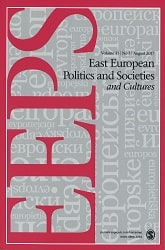Linkage, Leverage, and the Post-Communist Divide
Linkage, Leverage, and the Post-Communist Divide
Author(s): Lucan A. Way, Steven LevitskySubject(s): Political history, Government/Political systems, International relations/trade, Transformation Period (1990 - 2010), Post-Communist Transformation
Published by: SAGE Publications Ltd
Keywords: democratization; post-Communist politics; international factors;
Summary/Abstract: An important source of the post-Communist divide between a relatively democratic Central and Southeastern Europe on one side and a highly autocratic former Soviet Union on the other is the different character of the international environments in the two regions. Post-Communist countries differ along two key dimensions of the post–cold war international environment: Western leverage, or governments’ vulnerability to external pressure; and linkage to the West, or the density of a country’s economic, political, organizational, social, and communication ties to the European Union and the United States. High linkage and leverage in Central and Southeastern Europe generated intense international democratizing pressures, contributing to democratization even under unfavorable domestic conditions. By contrast, weaker linkage and leverage in the former Soviet Union has produced a much more permissive international environment. As a result, democratization has failed in the absence of a strong domestic push.
Journal: East European Politics and Societies
- Issue Year: 21/2007
- Issue No: 01
- Page Range: 48-66
- Page Count: 19
- Language: English
- Content File-PDF

